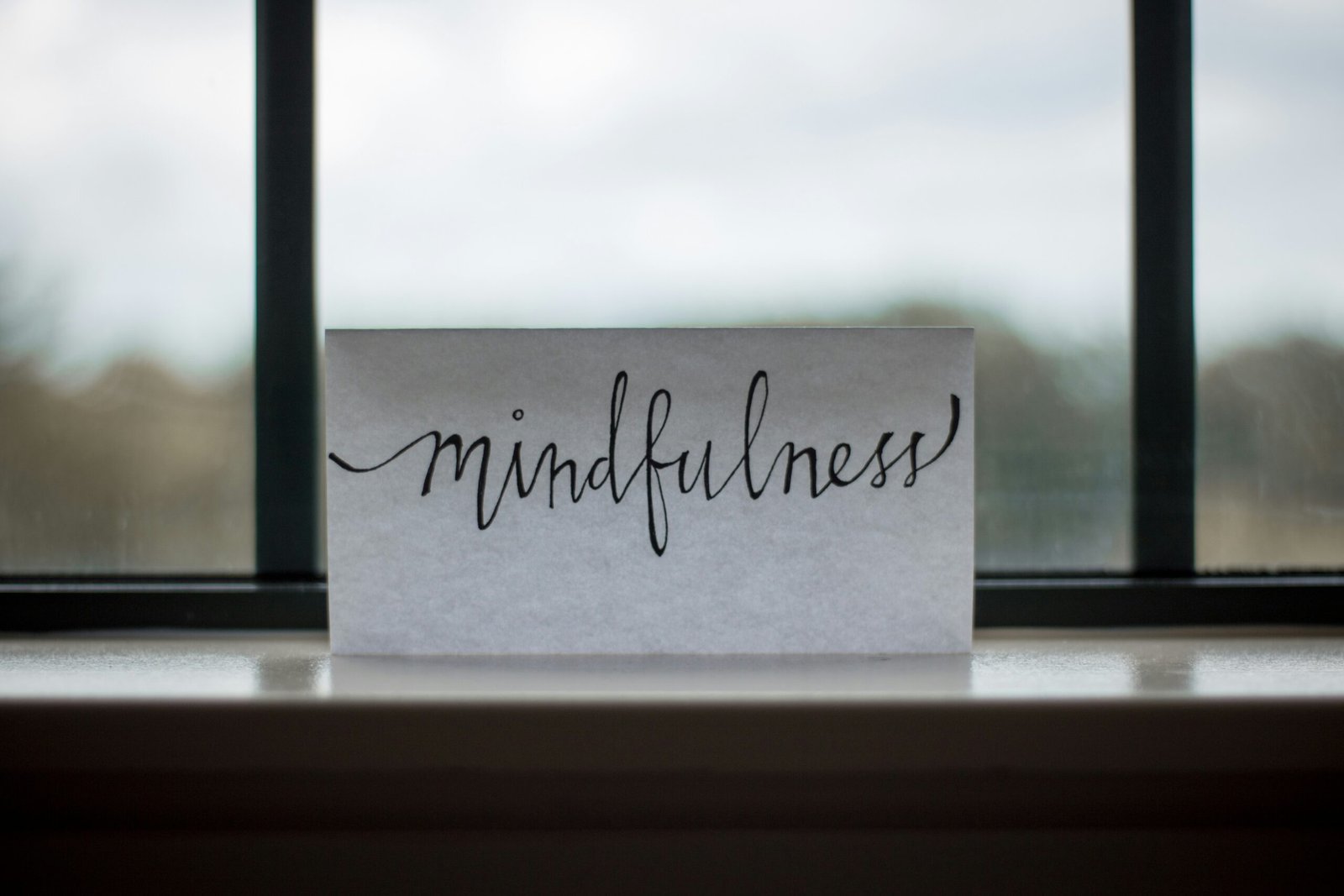Introduction to Mindfulness and Connection
Mindfulness refers to the practice of being present in the moment, fully engaging with one’s thoughts, feelings, and surroundings without judgment. This state of awareness allows individuals to connect more deeply with themselves and others, fostering genuine interactions. In a world increasingly dominated by distractions and fast-paced living, mindfulness offers a pathway to enhance relationships through intentional engagement and attentive listening.
At its core, mindfulness for better relationships emphasizes the importance of focusing on the present during interactions. When individuals practice mindfulness, they are better equipped to understand others’ emotions, thoughts, and needs. This awareness contributes significantly to building empathy and trust, which are essential components of any healthy relationship. By being attentive and present, individuals can recognize subtle cues in verbal and non-verbal communication, enriching their connections.
Moreover, practicing mindfulness encourages a non-reactive approach to communication. Instead of responding impulsively to challenging situations or emotions, mindful individuals take a moment to pause, reflect, and engage thoughtfully. This practice not only enhances personal resilience but also reduces misunderstandings and conflicts in relationships, creating a more harmonious interaction environment. The application of mindfulness in daily interactions can lead to a profound shift in how connections are cultivated and maintained.
As we delve deeper into specific mindfulness techniques, it is crucial to understand how being present in conversations, accepting feelings as they arise, and showing genuine interest can positively impact relationships. The following sections will explore practical strategies that incorporate mindfulness, equipping individuals with the tools to strengthen their connections with others.
The Benefits of Mindfulness in Relationships
Mindfulness is increasingly recognized as a valuable tool in fostering better relationships, both personal and professional. By cultivating mindfulness for better relationships, individuals can experience significant enhancements in communication, empathy, and emotional awareness. Research supports the assertion that mindfulness practices positively influence interpersonal dynamics, leading to more harmonious interactions.
One of the primary benefits of practicing mindfulness is the improvement in communication skills. Mindfulness encourages individuals to be fully present during conversations, allowing them to listen attentively without distraction. This active listening promotes clearer mutual understanding, as people feel heard and valued. Furthermore, the practice of mindfulness fosters a non-judgmental attitude, reducing the likelihood of misunderstandings and conflicts stemming from assumptions or misinterpretations.
Heightened empathy is another critical benefit derived from mindfulness. By fostering a greater awareness of their own emotions and thoughts, individuals become better equipped to understand the perspectives and feelings of others. This enhanced empathetic ability can lead to deeper connections, reduced defensiveness, and an overall increase in relational satisfaction. Scientific studies have highlighted the link between mindfulness practices and increased empathetic responses, affirming its efficacy in nurturing emotional bonds.
Additionally, practicing mindfulness enhances emotional awareness, equipping individuals with the tools to manage their emotions more effectively. When individuals become more attuned to their feelings, they are less likely to react impulsively or allow negative emotions to drive their behavior. This emotional regulation is crucial for maintaining healthy relationships, as it helps to de-escalate potential conflicts and promotes constructive dialogue.
In conclusion, the integration of mindfulness for better relationships offers a myriad of benefits, such as enhanced communication, improved empathy, and increased emotional awareness. As individuals adopt these practices, they are likely to witness transformative changes in the quality of their connections with others, fostering a more compassionate and understanding environment.
Basic Mindfulness Techniques to Start With
Incorporating mindfulness for better relationships can significantly enhance your connection with others. Here, we will explore basic mindfulness techniques such as breath awareness, body scan, and mindful listening, providing you with step-by-step instructions to easily integrate these practices into your daily routine.
Breath Awareness: This foundational mindfulness technique focuses on your breathing patterns to cultivate presence. To practice breath awareness, begin by finding a comfortable seated position. Close your eyes gently and take a deep breath in through your nose, allowing your abdomen to rise. Exhale slowly through your mouth. Continue to breathe deeply, directing your focus solely on the sensations of the breath entering and leaving your body. If your mind wanders, gently bring your attention back to your breath. Aim to practice this for five to ten minutes daily. This simple yet effective technique can help reduce anxiety and promote emotional regulation, leading to healthier interactions.
Body Scan: The body scan is a technique that enhances your bodily awareness and can foster greater compassion for yourself and others. Lie down comfortably and close your eyes. Starting at the top of your head, slowly direct your attention to each part of your body down to your toes, noticing any sensations, tension, or discomfort. Breathe into these areas as you observe them without judgment. This practice allows you to become more attuned to your physical state, ultimately aiding in connecting more authentically with those around you.
Mindful Listening: Mindful listening is essential for building trust and ensuring effective communication in relationships. When engaging in a conversation, focus entirely on the speaker. Show genuine interest by maintaining eye contact, nodding, and avoiding distractions. Resist the urge to formulate a response while the other person speaks. Instead, absorb their words and emotions fully. Practicing mindful listening can deepen your understanding of others, fostering a stronger bond.
Cultivating Empathy Through Mindfulness
Empathy plays a crucial role in fostering strong connections with others, and mindfulness provides valuable tools to enhance this essential quality. Engaging in mindfulness practices helps individuals cultivate a deeper awareness of their own emotions and the emotions of those around them, thereby creating a fertile ground for empathy. By integrating mindfulness for better relationships, individuals can learn to be more present in their interactions, leading to improved understanding and compassion.
One effective way to nurture an empathetic mindset is through perspective-taking exercises. These practices encourage individuals to step into the shoes of others and consider their thoughts, feelings, and experiences. For instance, during conversations, one might pause and reflect on the other person’s situation, asking oneself questions such as, “How would I feel in their place?” or “What might they be experiencing right now?” Such reflections heighten emotional intelligence and promote a strong sense of connection.
Integrating this perspective-taking into everyday interactions is crucial for cultivating empathy. Mindful listening is a practice that reinforces this approach; it involves fully engaging in the conversation and focusing on the speaker without formulating a response in advance. This attentiveness not only validates the other person’s feelings but also creates a safe space for authentic dialogue. By practicing mindful listening, one can respond with compassion and understanding, further enhancing relationships.
Additionally, daily mindfulness exercises, such as meditation or journaling about emotional experiences, can support the development of empathy. These practices provide individuals an opportunity to reflect on their emotions, understand their triggers, and recognize how these emotions affect their interactions with others. The more one understands oneself, the more adept one becomes at connecting with others on a deeper level. As such, embracing mindfulness can transform the way we relate to and empathize with the people in our lives.
Mindful Communication Techniques
Effective communication is fundamental for fostering healthy relationships. Implementing mindfulness in communication can significantly enhance the quality of interactions. One of the primary techniques involves active listening, which requires full attention to the speaker without distractions. This means setting aside personal thoughts or responses while the other person is talking. To practice active listening, maintain eye contact, nod to indicate understanding, and refrain from interrupting. This not only demonstrates respect but also ensures the speaker feels heard and valued.
Another critical aspect of mindful communication is engaging with non-verbal cues. Non-verbal elements such as facial expressions, posture, and gestures can convey feelings more profoundly than words. To enhance your mindfulness for better relationships, be mindful of your body language and adjust it to align with your verbal messages. For example, leaning slightly forward can signal interest and attentiveness, while crossing arms may indicate defensiveness or disinterest. By being aware of these signals, you can foster an environment of openness and understanding.
Creating a safe space for open dialogue is also vital. This involves setting a tone that encourages honesty and vulnerability. To achieve this, consider scheduling regular check-ins or conversations where individuals can express their thoughts without the fear of judgment. You may begin a conversation by stating your intention to listen actively and appreciate feedback, thus reinforcing that all contributions are welcome and valid. Inviting others to share their feelings or perspectives can deepen connections and promote a culture of mindfulness.
Incorporating these mindful communication techniques within your interactions can lead to more meaningful and fulfilling conversations. By focusing on active listening, paying attention to non-verbal cues, and creating a safe space for dialogue, individuals can significantly improve their relationships and enhance their emotional connections with others.
Overcoming Barriers to Connection
In the pursuit of deeper relationships, individuals often encounter several barriers that hinder genuine connection. Common obstacles include judgment, fear of vulnerability, and distractions. Recognizing and addressing these barriers is crucial for fostering emotional connections and developing mindful interactions with others.
Judgment, whether it stems from personal insecurities or preconceived notions, can severely inhibit open communication. When individuals approach conversations with a critical or biased mindset, they limit their ability to understand others fully. Practicing mindfulness for better relationships encourages individuals to observe their thoughts and judgments without attachment. By acknowledging these biases, one can learn to set them aside, allowing for a more authentic exchange of feelings and ideas.
Fear of vulnerability represents another significant barrier. Many people struggle to express their true emotions or share personal experiences due to a fear of rejection or misunderstanding. Mindfulness can facilitate this process by creating a safe mental space where individuals feel more equipped to explore their vulnerabilities. Through techniques such as focused breathing and body awareness, one can cultivate a sense of calm and security, enabling them to engage in courageous conversations that deepen connections with others.
Distractions, both external and internal, further complicate efforts to connect meaningfully. In a world dominated by digital media and constant notifications, maintaining presence during interactions is increasingly challenging. Mindfulness techniques can mitigate this issue by training individuals to stay grounded in the moment. Engaging fully with the person in front of them, whether through active listening or paying attention to nonverbal cues, can lead to more rewarding conversations and stronger relationships.
By recognizing and overcoming these barriers, individuals can harness mindfulness for better relationships, ultimately paving the way for deeper connections and a more fulfilling social experience.
Integrating Mindfulness Into Daily Interactions
Incorporating mindfulness into daily interactions can significantly improve our connections with others, whether at home, work, or in social settings. One effective strategy is to cultivate active listening. When engaging with someone, focus entirely on what they are saying without planning your response while they speak. This approach not only enhances understanding but also demonstrates genuine interest, fostering a deeper relationship. By being present in conversations, you acknowledge the importance of the other person’s thoughts and feelings, which is crucial for establishing meaningful connections.
Another technique involves being aware of your body language and non-verbal cues. Often, we may not realize how our body language affects our interactions. Maintaining an open posture, making eye contact, and nodding can convey engagement and empathy. Mindfulness for better relationships also involves checking in with yourself regularly. Pay attention to your emotions and thoughts during conversations. If you find yourself feeling distracted or reactive, take a moment to breathe deeply and refocus your attention on the speaker.
Additionally, consider integrating brief pauses into discussions. These moments of silence can provide space for reflection, allowing both you and the other person to process thoughts and feelings. Embracing silence can lead to more thoughtful responses, which enrich the conversation. It is also helpful to practice gratitude within your interactions. Acknowledging and appreciating the efforts and perspectives of others can nurture positive relationships.
By actively incorporating these mindfulness techniques into everyday exchanges, individuals can foster a more present and engaged atmosphere. This practice not only enhances personal relationships but also contributes to a more empathetic work environment and satisfying social interactions. Ultimately, the conscious effort to be mindful allows us to connect with others in more profound and meaningful ways.
Group Mindfulness Practices to Strengthen Bonds
Practicing mindfulness within a group setting can significantly enhance interpersonal connections among family members, friends, or colleagues. Shared mindfulness practices promote a sense of belonging and understanding, which are essential components of any meaningful relationship. A variety of activities can be utilized to foster this collective connection.
One effective way to engage in group mindfulness is through guided meditation sessions. These sessions can be facilitated by an experienced instructor or conducted informally among participants. Individuals can sit in a circle, allowing everyone to feel equally included. As the group focuses on their breathing and the meditative instructions, they cultivate not only personal awareness but also a shared experience that connects them on a deeper level. This practice can lead to heightened empathy and compassion among participants, fostering a more harmonious environment.
Another valuable activity is the implementation of structured group discussions centered around mindfulness themes. Participants can take turns sharing their thoughts on mindfulness for better relationships, including personal experiences or challenges they face. Encouraging open dialogue nurtures trust and vulnerability, which are crucial traits in building strong bonds. Listening actively and providing supportive feedback allows individuals to feel heard and valued, reinforcing their connection to one another.
Team-building exercises that incorporate mindfulness techniques can also be of great benefit. Activities such as collaborative problem-solving tasks or outdoor group challenges require participants to be present and engaged with one another. By focusing on collective goals while practicing mindfulness, participants can enhance their sense of community, creating stronger, more resilient relationships within the group.
Incorporating these group mindfulness practices into regular interactions can be an effective way to strengthen bonds, leading to improved understanding and collaboration among individuals. Through guided meditation, thoughtful discussions, and team-building exercises, participants can experience the transformative power of collective mindfulness.
Conclusion
As we delve into the transformative power of mindfulness for better relationships, it is essential to acknowledge the profound impact these techniques can have on our connections with others. Mindfulness encourages individuals to engage fully in the present moment, fostering a deeper awareness of their thoughts, feelings, and interactions. This heightened awareness serves as a catalyst for improving the quality of our relationships by promoting empathy, understanding, and effective communication.
Throughout this blog post, we have explored various mindfulness techniques that can significantly enhance our ability to connect with those around us. By practicing mindful listening, we cultivate an environment where our partners, friends, and family feel heard and valued. Additionally, integrating mindfulness into our daily routines allows us to respond more thoughtfully to the challenges and emotions that arise in our interactions, thereby reducing conflicts and misunderstandings.
It is vital to view the journey of developing mindfulness for better relationships as an ongoing process rather than a final destination. Each practice we adopt not only enriches our connections but also nurtures our personal growth. As we incorporate meditation, reflective practices, and conscious gratitude into our lives, we gradually transform not only our relationships but also our perception of ourselves and others. This evolution leads to a greater appreciation of the complexities and nuances of interpersonal connections.
In conclusion, embracing mindfulness techniques offers us an opportunity to deepen our relationships and foster a sense of belonging and connection. By committing to this path, we can enhance our emotional intelligence, develop stronger bonds, and create a supportive environment that benefits both ourselves and those we cherish. Let us embark on this enlightening journey, recognizing that the power of mindfulness lies not only in its practices but in the genuine connections we cultivate along the way.










